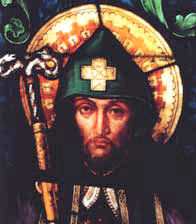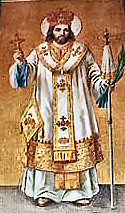“Increase our faith.” (Luke 17:5)
Have you ever tried to wiggle your ears? Everyone is supposed to be born with the right muscles. All you have to do is clench your back molars to activate the muscles. But most people still find it impossible to do.
In today’s Gospel reading, the apostles ask Jesus to give them something that they feel is impossible to attain without him: increased faith. In response, Jesus tells them that they already have all the faith they need. He goes so far as to say that even if their faith were as tiny as a mustard seed, they could do something as amazing as teleporting a tree into the ocean. This tiny mustard seed, which was well known for rapidly growing into a nine-foot tall plant, must have created a clear image of hope for the discouraged apostles.
Did you know that you have sufficient faith to do great things as well? You may feel inadequate, but the real question is how you can tap into the faith that you already have—and as a result make it even stronger. Here are a few ideas.
Read the Bible. St. Paul tells us: “Faith comes from what is heard, and what is heard comes through the word of Christ” (Romans 10:17). Immerse yourself in Scripture, and watch your knowledge, love, and trust in God grow.
Exercise your faith. St. James once wrote: “Faith of itself, if it does not have works, is dead” (James 2:17). Take the initiative to do God’s work on earth—especially in helping the poor and needy. Just as you would exercise your arms to make them stronger, exercising your faith will only strengthen it as you see God’s blessings on your work.
Journal. Many saints, like Augustine, used journaling as a way to deepen their faith. Jot down those times that the Lord has answered your prayers, and reread those accounts when you find fear or insecurity hampering your faith journey.
Just as that little mustard seed amazes people in the speed and breadth of its development, if you actively work on increasing your faith, you’ll look back and marvel at the growth you have made.
“Lord, show me the path to increasing the faith that you have already given me. By your Spirit, equip me to love and serve you even more.”
Titus 1:1-9; Psalm 24:1-6

 Josaphat Kuncewitcz was born about the year 1580 at Vladimir, Volhynia, [part of the Polish province of Lithuania at the time] and given the name John at baptism. While being instructed as a child on the sufferings of our Savior, his heart is said to have been wounded by an arrow from the sacred side of the Crucified. In 1604 he joined the Ukrainian Order of Saint Basil (Basilians), lived as a monk in a very mortified life, went barefoot even in winter, refrained from the use of wine and flesh-meat, and always wore a penitential garb. In 1614 he was appointed archimandrite of Vilna, Russia and four years later archbishop of Polotzk; in this position he worked untiringly for Church reunion. He was a great friend of the poor, once even pledged his archepiscopal omophorion (pallium) to support a poor widow. The foes of union decided to assassinate him. In a sermon, he himself spoke of his death as imminent. When he visited Vitebsk (now in Russia), his enemies attacked his lodging and murdered a number of his companions. Meekly the man of God hastened toward the mob and, full of love, cried, "My children, what are you doing? If you have something against me, see, here I am." With furious cries of "Kill the papist!", they rushed upon him with gun and sword. Josaphat's body was thrown into the river but emerged, surrounded by rays of light, and was recovered. His murderers, when sentenced to death, repented their crime and became Catholics.
Josaphat Kuncewitcz was born about the year 1580 at Vladimir, Volhynia, [part of the Polish province of Lithuania at the time] and given the name John at baptism. While being instructed as a child on the sufferings of our Savior, his heart is said to have been wounded by an arrow from the sacred side of the Crucified. In 1604 he joined the Ukrainian Order of Saint Basil (Basilians), lived as a monk in a very mortified life, went barefoot even in winter, refrained from the use of wine and flesh-meat, and always wore a penitential garb. In 1614 he was appointed archimandrite of Vilna, Russia and four years later archbishop of Polotzk; in this position he worked untiringly for Church reunion. He was a great friend of the poor, once even pledged his archepiscopal omophorion (pallium) to support a poor widow. The foes of union decided to assassinate him. In a sermon, he himself spoke of his death as imminent. When he visited Vitebsk (now in Russia), his enemies attacked his lodging and murdered a number of his companions. Meekly the man of God hastened toward the mob and, full of love, cried, "My children, what are you doing? If you have something against me, see, here I am." With furious cries of "Kill the papist!", they rushed upon him with gun and sword. Josaphat's body was thrown into the river but emerged, surrounded by rays of light, and was recovered. His murderers, when sentenced to death, repented their crime and became Catholics.  Pope Martin I (649-654) was outstanding for virtue and knowledge. He was selected by divine Providence to be the supreme defender of the doctrine that in Christ there are two wills, a divine and a human, against the monothelite teaching of one will, favored at Constantinople. Immediately after ascending the papal throne, he convoked a synod at the Lateran which put the true teaching in its proper light and condemned the opposing error. Emperor Constans II supported the monothelite patriarch of Constantinople and commissioned the Exarch Olympios to assassinate the Pope. The Exarch entrusted the task to a lictor to murder Martin during Mass in the church of St. Mary of the Crib. The lictor could not accomplish the mission because he was suddenly struck blind. From that moment many misfortunes befell the Emperor, but no change in attitude resulted. Instead he sent the Exarch Theodor Kalliopes to Rome with orders to arrest the Pope.
Pope Martin I (649-654) was outstanding for virtue and knowledge. He was selected by divine Providence to be the supreme defender of the doctrine that in Christ there are two wills, a divine and a human, against the monothelite teaching of one will, favored at Constantinople. Immediately after ascending the papal throne, he convoked a synod at the Lateran which put the true teaching in its proper light and condemned the opposing error. Emperor Constans II supported the monothelite patriarch of Constantinople and commissioned the Exarch Olympios to assassinate the Pope. The Exarch entrusted the task to a lictor to murder Martin during Mass in the church of St. Mary of the Crib. The lictor could not accomplish the mission because he was suddenly struck blind. From that moment many misfortunes befell the Emperor, but no change in attitude resulted. Instead he sent the Exarch Theodor Kalliopes to Rome with orders to arrest the Pope.